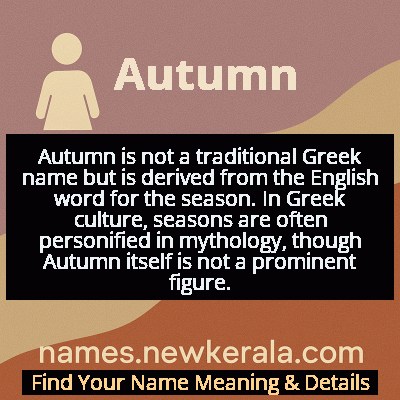Autumn Name Meaning & Details
Origin, Popularity, Numerology Analysis & Name Meaning of Autumn
Discover the origin, meaning, and cultural significance of the name AUTUMN. Delve into its historical roots and explore the lasting impact it has had on communities and traditions.
Name
Autumn
Gender
Female
Origin
Greek
Lucky Number
9
Meaning of the Name - Autumn
Autumn is not a traditional Greek name but is derived from the English word for the season. In Greek culture, seasons are often personified in mythology, though Autumn itself is not a prominent figure.
Autumn - Complete Numerology Analysis
Your Numerology Number
Based on Pythagorean Numerology System
Ruling Planet
Mars
Positive Nature
Generous, passionate, energetic, and humanitarian.
Negative Traits
Impulsive, impatient, moody, and can be overly emotional.
Lucky Colours
Red, maroon, scarlet.
Lucky Days
Tuesday.
Lucky Stones
Red coral, garnet.
Harmony Numbers
1, 2, 3, 6.
Best Suited Professions
Military, sports, philanthropy, leadership roles.
What People Like About You
Courage, energy, leadership, generosity.
Famous People Named Autumn
Autumn Reeser
Actress
Prominent television roles in popular series and films
Autumn Phillips
Royal Family Member
Marriage into British royal family brought name to international attention
Autumn de Forest
Artist
Internationally recognized painter and child prodigy
Autumn Chiklis
Actress
Television actress known for soap opera roles
Name Variations & International Equivalents
Click on blue names to explore their detailed meanings. Gray names with will be available soon.
Cultural & Historical Significance
Extended Personality Analysis
People named Autumn are typically perceived as possessing the season's quintessential characteristics: they are often warm, grounded individuals with a natural elegance and depth. Like the changing leaves, Autumns tend to be adaptable and comfortable with transformation, often serving as stabilizing forces during periods of change in their social circles. They frequently exhibit a creative, artistic sensibility and an appreciation for beauty in transition—finding value in both growth and release. Their personality often combines the maturity of harvest time with the vibrant energy of fall colors, making them both reliable and inspiring companions. Many Autumns demonstrate strong nurturing instincts and emotional intelligence, perhaps reflecting the season's association with gathering and preparation. They tend to be introspective yet socially engaged, capable of deep reflection while maintaining warm connections with others.
Modern Usage & Popularity
In contemporary naming practices, Autumn has evolved from a novelty nature name to a established favorite with enduring appeal. Since entering the US Social Security Administration's top 1000 names in 1969, it has climbed steadily, maintaining top 100 status for over two decades. The name's popularity reflects broader cultural trends toward nature-inspired names that are both meaningful and accessible. Modern parents choose Autumn for its elegant sound, strong seasonal imagery, and positive associations with harvest abundance and natural beauty. The name performs consistently across different regions and demographics, appealing to urban and rural families alike. Recent data shows slight fluctuations but overall stability, suggesting Autumn has transitioned from trend to classic status in the nature-name category. Its usage extends beyond English-speaking countries as globalization makes seasonal names more universally appreciated.
Symbolic & Spiritual Meanings
Symbolically, Autumn represents the rich complexity of life's transitional phases—it embodies both abundance and release, beauty and impermanence. The season serves as a powerful metaphor for maturity, when the seeds of earlier efforts come to fruition and wisdom is harvested from experience. Autumn symbolizes the graceful acceptance of change, teaching that endings can be beautiful and necessary for new beginnings. Its vibrant colors represent the full expression of identity before the quiet reflection of winter. In many cultural traditions, autumn is associated with gratitude and celebration through harvest festivals, connecting the name to themes of thankfulness and community. The falling leaves symbolize letting go of what no longer serves growth, while the harvested fields represent the tangible results of dedication and care. This rich symbolic tapestry makes Autumn a name that carries profound meaning about life's cyclical nature and the beauty found in transition.

